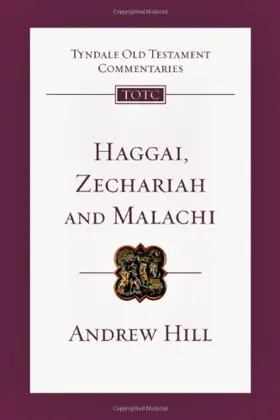

Haggai, Zechariah, and Malachi
in Tyndale Old Testament Commentaries
Pages
368
Publisher
InterVarsity Press
Published
8/1/2012
ISBN-13
9780830842827
Collections
This book appears in the following featured collections.
- Basic Library Booklist by Detroit Baptist Theological Seminary
- TGC: Introductory Commentaries by The Gospel Coalition
Reviews
Hill’s exegetical sensibilities are astute, and his writing is clear. He accurately identifies the historical context of God’s oracles to these three prophets, situating them during Israel’s return from the Babylonian exile. Hill argues that in response to Israel’s spiritual distress, God raised up these three prophetic voices in Jerusalem. He also makes clear how these prophets remain timely for the church’s worship and mission in the world today.
[Full Review]
Andrew E. Hill’s commentary on Haggai, Zechariah and Malachi is part of several replacement volumes in the Tyndale Old Testament Commentary series under the editorship of David G. Firth. Hill has already contributed a technical treatment of Malachi in the Anchor Bible Commentary series, and his high level of scholarship comes through with remarkable clarity and approachability in this new volume. Hill includes a general introduction to the post-exilic prophets in which he gives the historical background for these books. He has a high view of Scripture and handles the text with care. Each book then has an individual introduction. In the commentary section, each pericope is handled under three sections: Context, Comment and Meaning. In the Context section, Hill sets the pericope in the broader context of the book and provides historical information deemed necessary for interpretation. The Comment section provides the meat of the commentary, the comments on the text. Finally, the Meaning section allows Hill to do biblical theology connecting the themes of the text to the whole canon of Scripture and to give suggestions for the theological application for the contemporary reader. Hill manages to use these three sections in a helpful way that does not become redundant or make the reader work too hard to find sought after information.
In his introduction, Hill states “We read the Bible as theology (the revelation of God and his redemptive plan for humanity), history (the record of God’s dealings with humanity, and especially Israel) and literature (the story of God and human experience) (p. 12). Indeed, these are the three emphases of this commentary, and they are very well done. Technical comments on the Hebrew are not frequent, as that is not the aim of this commentary, but Hill provides explanations of the philology and grammar as necessary. The great strength of this commentary is in showing how the historical and literary features of the book contribute to the theological meaning. Hill holds to an already/not yet eschatology on the apocalyptic sections of Zechariah, and his comments there are very sane and helpful. Hill also brings a helpful emphasis to the theology of the Holy Spirit in these books, a theme he argues is not given its due in three books that emphasize God’s people are victorious “not by might nor by power, but by the Spirit.” In all of this, Hill manages to remain readable and clear. This commentary will be a welcome guide for laypeople and an excellent first stop for pastors preparing to preach these books.
IVP provided me with a free review copy with no expectation that I provide a positive review.

